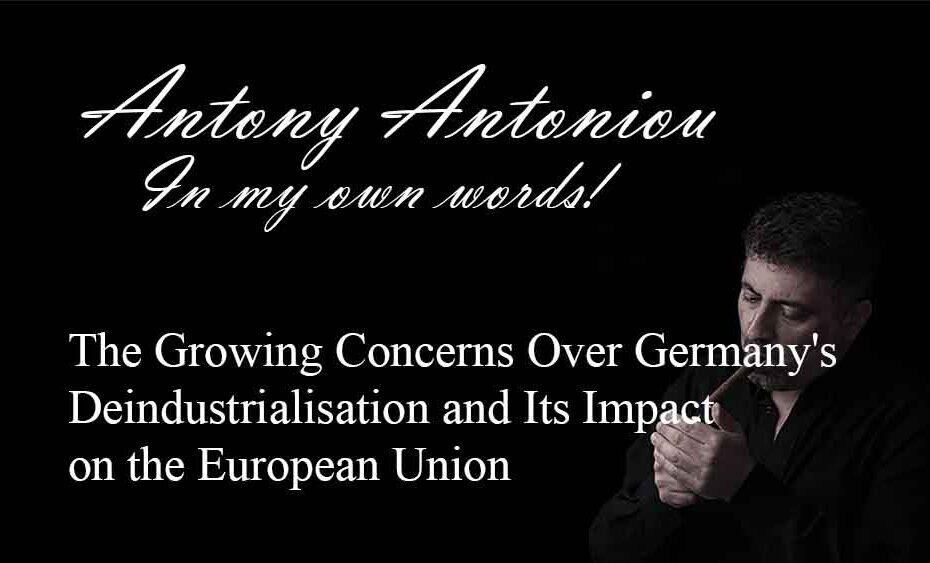The Growing Concerns Over Germany’s Deindustrialisation and Its Impact on the European Union
Introduction
In recent times, the economic situation in Germany has been a topic of concern, particularly with the country’s ongoing deindustrialization. The financial times have reported that Germany’s economy remained stagnant in the last quarter, neither growing nor contracting. However, the true story behind these figures reveals an increasingly rapid decline in industrial production. As pessimism grows among German industrialists, the outlook for the country’s industry appears bleak, drawing comparisons with the aftermath of the 2008 financial crisis. This blog post delves into the implications of Germany’s deindustrialization and its potential impact on the European Union.
Deindustrialisation in Germany
The ominous signs of deindustrialization in Germany are hard to ignore. Rapid declines in industrial production, coupled with gloomy PMI surveys, paint a worrying picture for the German economy. The issue has escalated to the point where even the mainstream media and German business leaders have started discussing it. The business community has raised concerns over energy policies and the green transition, which they believe are being enforced too hastily.
The Role of Sanctions and Energy Policy
The suspension of Nord Stream 2 and the implementation of sanctions have been significant contributors to Germany’s deindustrialization. While some are reluctant to admit that the sanctions are a mistake, it is evident that they have had a substantial impact on the country’s industrial decline. Reversing these decisions now would be a complex and time-consuming process, given the preparation required for Nord Stream 2 and the geopolitical obstacles in the way.
The Political Backlash and Rising Unhappiness
The political repercussions of Germany’s deindustrialization are becoming apparent. Recent polls indicate a growing shift in public sentiment. The Alternative for Germany (AfD) party, known for its opposition to current policies, is gaining support, particularly in the former East Germany. Chancellor Schultz’s SPD has seen a decline in support, reflecting the rising dissatisfaction with the current political landscape.
The European Union’s Challenges
The deindustrialization in Germany has wider implications for the entire European Union. As Germany serves as the EU’s export machine, the weakening of its industrial sector has led to a loss of competitiveness in global markets. While the United States has experienced economic growth, the EU has remained stagnant, with its economy growing only six percent over 15 years. The EU’s dependence on exports means that the decline of German goods further erodes its export position.
The Future of the European Union
Given the precarious situation, the European Union faces a significant challenge in sustaining its financial stability. The EU’s primary cash provider, Germany, is grappling with deindustrialization, putting immense strain on the economic structure of the entire union. The situation has raised concerns about the EU’s long-term energy security, prompting calls for support to Ukraine and increased pressure on Russia, as part of a neocon plan to gain control over Russian resources.
Conclusion
– The economic situation in Germany raises concerns due to ongoing deindustrialization.
– In the last quarter, Germany’s economy remained stagnant according to the financial times.
– Rapid decline in industrial production and pessimism among German industrialists are alarming indicators.
– Mainstream media and German business leaders are discussing the deindustrialization issue.
– Sanctions and energy policies have played a significant role in Germany’s industrial decline.
– Germany’s political landscape faces a backlash, with growing support for the Alternative for Germany (AfD) party.
– The European Union’s economy has grown only 6% over 15 years, compared to 82% growth in the United States.
– Germany’s deindustrialization has affected the EU’s export competitiveness.
– The EU’s long-term energy security is a concern, leading to calls for support to Ukraine and pressure on Russia.
– The EU’s financial stability faces challenges due to Germany’s deindustrialization and its impact on the entire union.
Germany’s ongoing deindustrialization poses a serious threat to its economy and has far-reaching implications for the European Union. The decline in industrial production, coupled with political unrest, indicates a potential industrial recession in Germany. The EU’s export-driven economy is losing competitiveness, and its financial growth remains stagnant. Amid these challenges, the EU is faced with the need to reconsider its policies and find sustainable solutions to support its member states. The future remains uncertain, but addressing the issue of deindustrialization and fostering a cohesive approach will be crucial for the EU’s long-term stability and success.


This makes perfect sense, the treacherous EU actually provoked this war, with the aim of gaining control over Russian minerals, but it has backfired badly and now it is the EU which is suffering the consequences and quite rightly so.